Summary:
1. The Omaha Zoo has a unique approach to the health care of its animals, focusing on voluntary participation.
2. One fascinating example is how they train cheetahs to voluntarily offer their tails for blood draws.
3. The positive reinforcement techniques used by keepers and veterinary technicians make this process possible.
4. The Omaha Zoo’s approach highlights the importance of animal welfare and the relationship between keepers and animals.
5. This innovative method sets a positive example for other zoos and animal care facilities.
Are you ready for a wild adventure into the fascinating world of animal health care? Join us as we explore the incredible techniques employed by the Omaha Zoo to ensure the well-being of its magnificent creatures. Prepare to be enthralled as we uncover the secrets behind the voluntary blood draw training method for cheetahs and witness the exceptional bond between keepers and animals. Get ready for a journey of discovery and inspiration!
The Omaha Zoo takes animal care to a new level, promoting voluntary participation in health care routines. Their unique approach provides exceptional care for the animals and emphasizes the deep connection between keepers and their charges. One extraordinary example of this method is the voluntary blood draw training for cheetahs.
Imagine a world where even the fastest land animal willingly presents its tail for a blood draw. It may sound like a fantastic movie scene, but it’s a reality at the Omaha Zoo. Through positive reinforcement, keepers and veterinary technicians have successfully trained cheetahs to voluntarily offer their tails for these important health procedures.
Positive reinforcement is the key to this remarkable training method. Instead of relying on force or coercion, the keepers at the Omaha Zoo have discovered that rewarding desired behavior achieves optimal results. The cheetahs are conditioned to see the blood draw process as a positive experience, ensuring their cooperation and minimizing stress.
The training begins with small steps, gradually acclimating the cheetahs to the procedure. Initially, keepers touch the cheetah‘s tail without drawing blood, offering treats and praise for calm behavior. As the animals become more comfortable, the keepers begin simulating the blood draw process, gently pressing a needle against the tail to mimic the sensation.
Through repetition and positive reinforcement, the cheetahs learn to associate the presence of a veterinary technician with rewards and painless procedures. This trust-building is at the core of the Omaha Zoo’s philosophy on animal care and sets a shining example for other zoos and wildlife facilities worldwide.
The voluntary blood draw training allows for routine health checks and enables early detection of potential health issues. Regular blood work helps monitor vital parameters, assess organ function, and identify potential illnesses or infections. By willingly participating in these procedures, the cheetahs play an active role in their health care, contributing to their overall well-being and longevity.
The success of this training method is a testament to the dedication and expertise of the keepers and veterinary technicians at the Omaha Zoo. Their commitment to creating a positive animal environment shines through in every interaction. The attentive care and consideration of the cheetahs during the blood draw process highlight their unwavering devotion to animal welfare.
At the Omaha Zoo, the bond between keepers and animals transcends the confines of traditional captivity. Through their innovative training techniques, the Zoo has fostered a nurturing environment where animals actively participate in their care. This approach ensures the health and happiness of the creatures under their stewardship and reinforces the importance of empathy and understanding in our relationship with wildlife.
We are left with a sense of wonder and inspiration as we bid farewell to the awe-inspiring world of voluntary blood draw training for cheetahs at the Omaha Zoo. The dedication, ingenuity, and unwavering love demonstrated by the keepers and veterinary technicians remind us of the infinite possibilities that exist when we prioritize the well-being of our animal friends. The Omaha Zoo’s commitment to voluntary health care is a beacon of hope, illuminating a brighter future in animal conservation and welfare.
*****
Source Description
The animals at the Zoo are trained to voluntarily participate in their health care. With the help of our keepers and positive reinforcement, our veterinary technicians can acquire blood samples from the tails of our cheetahs.


